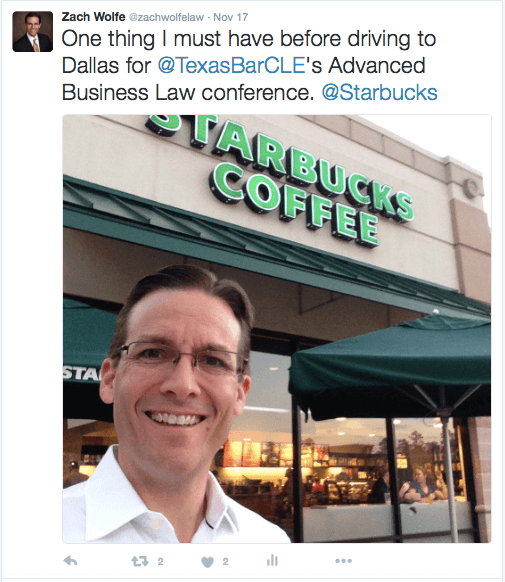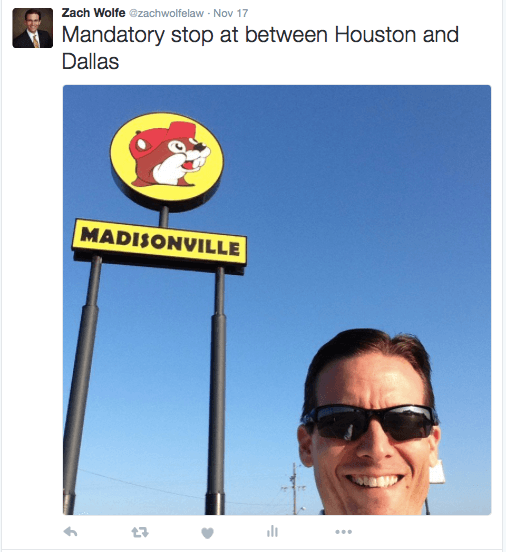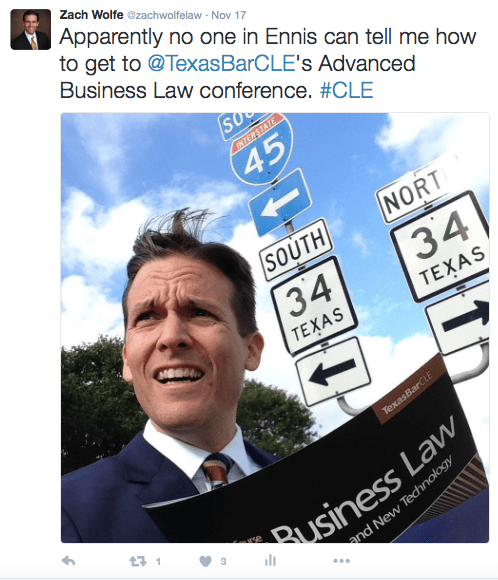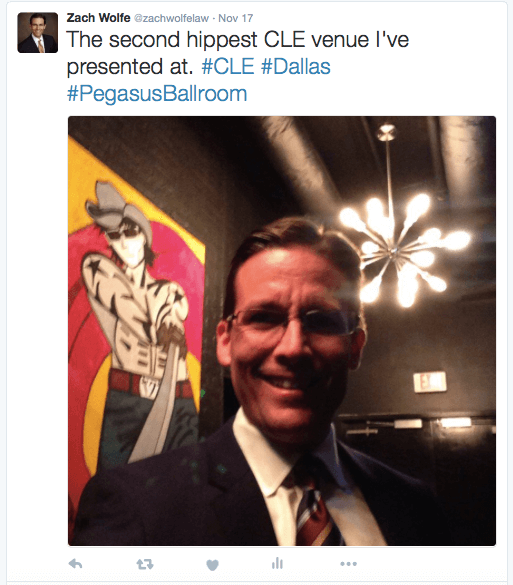After this original post, the Texas Supreme Court approved significant changes to the Texas lawyer ethics rules in a May 15, 2021 order you can download here. You can read about these changes in my post Top 15 Proposed Changes to Texas Lawyer Advertising Rules. Those changes loosen some of the rules covered below, but following my tips is still probably a good idea.
Complying with the ethics rules for Texas lawyers can actually make your social media content more effective
This week’s challenge: give Texas lawyers the key tips they need to use social media without violating ethics rules, while also giving non-lawyers tips on more effective use of social media for professional networking and business development. My hypothesis is that complying with the ethics rules for Texas lawyers can actually make your use of social media more effective, whether you are a Texas lawyer, a non-Texas lawyer, or not a lawyer at all.
First a little background. If you follow me on LinkedIn or Twitter (see photos below), you know that last week I hit the road to Dallas to present “It’s Not Just for Millennials – How to Incorporate Social Media into Your Business Development Efforts Without Violating Ethics Rules.” I often speak to Texas lawyers about how to use social media in a way that complies with the advertising rules in the Texas Disciplinary Rules of Professional Conduct.
I typically tell Texas lawyers there is good news and bad news for lawyers who use social media. The bad news is that the Texas ethics rules are both unclear and potentially onerous when applied to social media, the worst of both worlds. But the good news is that the Texas State Bar has issued interpretive comments that use some common sense to apply the poorly written ethics rules to social media. If you like details and need to be shown the backup, you can read the applicable rules, interpretive comments, and some brilliant commentary here.
But if you just want the bottom line, keep reading.
Tip #1: Use your social media posts to educate and inform your target audience, not to make a sales pitch
The Problem with the Texas Ethics Rules: They generally require all advertising to be filed with the State Bar’s Advertising Review Committee. Promoting your experience or qualifications in a social media post that is available to the general public is advertising. But filing every tweet, status update, or post with the State Bar would be a huge pain.
Take for example Peggy Schuyler, a transactional lawyer who focuses her practice on handling commercial real estate deals. She could post “I’m proud to announce I’ve been named a 2016 Texas Legion of Justice Super Friend in Commercial Real Estate Law.” There’s nothing unethical about that, but it would be advertising that she would need to file.
Help from the Texas State Bar: Social media content that is “educational or informational” is generally not advertising.
[The new proposed rules would not expressly include this “educational or informational” guidance, but they should.]
Why This is Actually Good for Lawyers and Other Professionals: It’s usually more effective to show people your expertise than to tell people how great you are. Take Peggy, for example. Telling people about an award she won is probably better than nothing, but many firms post announcements like this, and they sound like advertising. Instead, what if Peggy posted a link to an article about the year’s top 10 commercial real estate transactions in her city? Her target audience will probably find that more interesting, and because it’s “educational or informational,” it’s not advertising.
Tip #2: Think about whether you really want or need the “call to action”
Lawyers can get “marketing” guidance from a wealth of literature from the world of sales. For example, my friend Drew Sanocki at Nerd Marketing is an e-commerce expert who knows all the hacks that can help online retailers increase their sales. Online marketing experts typically say your social media post needs to have a “call to action.” For example, they would tell Peggy to add, “Call me today if you or your client needs help with a commercial real estate transaction.”
The Problem with the Texas Ethics Rules: The “call to action” may be great sales advice, but it creates a problem for lawyers. When Peggy adds the call to action, she has just crossed the line into advertising. That means she needs to file her post with the State Bar.
[This issue would not change under the new proposed rules.]
Why This is Actually Good for Lawyers and Other Professionals: I feel like leaving out the call to action is good advice for lawyers and other professionals anyway. You’re selling professional expertise, not inexpensive razor refills. The call to action makes your post sound like just another sales pitch, and it doesn’t seem that necessary. People know they can hire you. In the history of the universe, has anyone ever read a lawyer’s social media post and thought, “I was thinking about hiring this guy, but he didn’t say he’s taking new clients, so I guess I’ll go somewhere else”?
Tip #3: Don’t overstate your role in good results obtained
The Problem with the Texas Ethics Rules: Taken literally, the rules prohibit a lawyer from stating a past success or “result obtained” if the lawyer was not lead counsel. So, for example, if I say in my social media profile that I “assisted” the trial team in the defense of a trademark infringement claim (which is absolutely true), the literal interpretation of the rule says this is a prohibited “misleading” statement, because I was not lead counsel.
[The new proposed rules would eliminate this problematic language and rely on the more general prohibition of false or misleading communications. This is a welcome improvement.]
Help from the Texas State Bar: The interpretive comment says you don’t have to be lead counsel as long as you don’t “claim responsibility” for the result obtained. So my statement about “assisting” the trial team is fine, because I’m not claiming responsibility for the result.
Why This is Actually Good for Lawyers and Other Professionals: Have you ever read a lawyer’s list of results obtained and thought, “wow, that’s a lot of accomplishments for such a young lawyer”? Do you sometimes think, “I wonder if this lawyer’s role in these cases was not quite what he’s making it out to be”? When a lawyer overstates his or her role in past successes, it has the opposite of the intended effect. So this is another case where following the ethics rules will actually improve the effectiveness of your content.
Tip #4: Don’t compare yourself with other professionals in your field
The Problem with the Texas Ethics Rules: None. In this case, the rule is fairly clear and not that onerous: don’t state comparisons with other lawyers that cannot be supported with objective, verifiable data. This means that most opinions comparing yourself to other lawyers are off limits. You can’t say things like “we’re the toughest lawyers in town” or “we’re the best law firm in Texas if you want a big recovery.”
[The new proposed rules would delete this specific prohibition, but they would still generally prohibit leading a reasonable person to reach a conclusion with no reasonable factual foundation.]
Why This is Actually Good for Lawyers and Other Professionals: Tooting your own horn in comparison with other professionals in your field is not the best use of social media. Like the “call to action” discussed above, it sounds too sales pitchy. It’s all about you instead of providing valuable information to your audience. And talking down other people who do what you do is not a good marketing strategy for professionals. As with overstating your role in successful cases, it doesn’t inspire confidence; it just makes you look insecure.
Tip #5: Leave the opinions out of your profile on LinkedIn and other social media
I’ve noticed that the slicker and more professional law firm websites—the ones that you guess expensive marketing consultants helped prepare—tend to have this kind of statement:
Zach Wolfe is a tough, aggressive litigator who fights hard for the best possible outcome for his clients. He is dedicated to thoroughly understanding the problems faced by his clients and crafting creative solutions. Zach’s clients value his uncanny knack for persuading juries in even the most difficult and complex cases . . .
Marketing gurus must think this kind of thing is effective. Notice the heavy use of subjective opinions that are virtually impossible to back up with data.
I’m not a fan of this. I may get some pushback here, but hear me out. Not only is your profile better when you stick to the facts, leaving out the self-serving opinions may also help you avoid making your profile an “advertisement” required to be filed with the State Bar.
The Problem with the Texas Ethics Rules: Warning, this one is a downer. Do you have a profile on LinkedIn? Does it describe your experience and qualifications as a lawyer? Is it accessible to the public? Have you filed the profile with the State Bar?
If you’re a Texas lawyer, I’m willing to bet you answered yes, yes, yes, and no. I’ve only met one Texas lawyer who has filed his LinkedIn profile—or any other social media profile—with the State Bar.
This is a potential problem. If your social media profile is publicly accessible and describes your experience and qualifications, then technically it’s “advertising in the public media” that must be filed. “But no one does that!” you say. True, but good luck with the “everyone’s doing it” defense.
[The new proposed rules would help by exempting “a communication on a professional social media website to the extent that it contains only resume-type information.”]
Help from the Texas State Bar: Sorry, no official help. In fact, the interpretive comment states explicitly: “Landing pages such as those on Facebook, Twitter, LinkedIn, etc. where the landing page is generally available to the public are advertisements.”
Why This is Actually Good for Lawyers and Other Professionals: For this one, it’s complicated. Texas lawyers have a range of unattractive options. You could take the ultra-cautious approach and change the settings on LinkedIn so your profile is only visible to your connections. But do you really want to hide your light under a bushel? Another option is to bite the bullet and file your profile with the State Bar, but that seems likely to open another can of worms.
On the other end of the spectrum, hakuna matata. You could just not worry about it, hoping that out of the thousands of Texas lawyers who have not filed their social media profiles, the State Bar won’t decide to make an example of you.
I tend to favor a middle ground: take the opinions out of your profile and focus on your basic contact information and practice areas. This kind of information is exempt from the filing requirement. This does not entirely solve the problem, because your profile will probably still have endorsements and recommendations, which don’t fall under any official exemption. But at least you have made a good faith effort to limit your profile to exempt information.
And your profile is better without the self-serving subjective opinions anyway, whether you are a lawyer or some other kind of professional.
Do you disagree? If so, I’d like to hear from you.
_____________________________________________________
Zach Wolfe (zach@zachwolfelaw.com) is a Texas trial lawyer who handles non-compete and trade secret litigation at his firm Zach Wolfe Law Firm (zachwolfelaw.com). Thomson Reuters named him a Texas “Super Lawyer”® for Business Litigation in 2020, 2021, and 2022.
These are his opinions, not the opinions of his firm or clients, so don’t cite part of this post against him in an actual case. Every case is different, so don’t rely on this post as legal advice for your case.









Comments:
Excellent post and, as you say, also great for non-lawyers. Keeping one’s blogs or other entries ‘low-key’ or, better yet, focused on the topic, in social media, and especially profiles, has always seemed to me to be the best form of “advertising” – who wants to be part of the “masses”…those hyped up, tiresome posts that say nothing but lead directly to the inevitable “we can help, and are the best of the best”? They are not informative, and actually become irritating when one is expecting to get some insight into an stated topic. As you state here so well, understatement can be the best advertising; it certainly is a better reflection than self-promotion, of who a person is.
Thanks, Aaron. Well said.